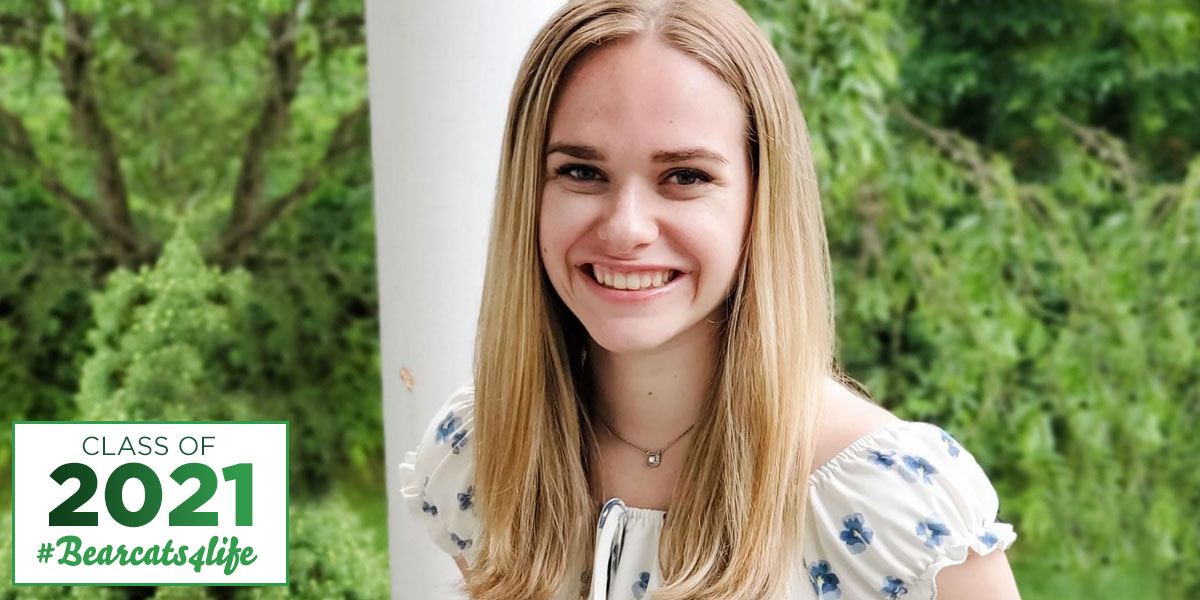Commencement 2021 profile: Caitlin Vitro
Caitlin Vitro gets her start in biochemical research

When treating complex diseases such as cancer, doctors and patients face a conundrum. The same drugs that treat the disease also lead to significant and sometimes unbearable side effects, from intense nausea to hair loss.
As a researcher, Caitlin Vitro hopes to someday create drugs that can mitigate these side effects, while still providing effective treatment for disease.
“I love how chemistry can be used for so many applications, specifically for medicine,” said Vitro, who focused her Binghamton University undergraduate work on biological chemistry. “The idea that, through science, I am able to help individuals and impact society fills me with such joy and inspiration.”
Chemistry was her favorite high school class back home in Carmel, which is why she decided to pursue the field. An invitation to join the First-Year Research Immersion (FRI) program led her to Binghamton.
“I thought it would be a great opportunity to begin research and felt like I couldn’t pass it up,” she said.
In her first chemistry classes, she knew she made the right choice. She began her research trajectory in biomedical chemistry through FRI, which lasts three semesters. For the last two years, she has worked in Assistant Professor L. Nathan Tumey’s lab in Binghamton’s School of Pharmacy and Pharmaceutical Sciences, researching antibody-drug conjugates (ADCs), typically used for the targeted delivery of cancer drugs. In Tumey’s lab, she realized that she wanted to pursue research long-term, working for a biotech or pharmaceutical company.
Her time as both a student researcher and a teaching assistant not only deepened her Binghamton experience, but laid the foundation for her future. Through these avenues, she developed skills in communication, teamwork and working independently, and also met some of her best friends, she said.
A trio of professors played a major role in her Binghamton experience: Tumey, Research Assistant Professor Susan Flynn and Chemistry Director of Instruction and Outreach Alexsa Silva.
“They have all helped me grow tremendously as a student, a teacher and a researcher. I definitely would not be where I am today without their help over the past four years,” she said.
Vitro prepared and screened a large library of molecules that is being used in Tumey’s lab for the design of new drug-delivery technology. In addition to her solid scientific knowledge, she has a triad of skills that are critical for successful laboratory work: excellent verbal and written communication skills, independence and the willingness to fail, and good recordkeeping and organization habits, Tumey said.
“Right from the first week she joined my lab, I knew that Caitlin was going to accomplish great things,” he said. “Caitlin has been enormously successful in my lab, and the results that she has generated will be making an impact on our work for years to come.”
Vitro doesn’t spend all her time in the classroom or the lab, however. As a student ambassador, she welcomes future Bearcats and their families to campus, answering questions about classes, the best dining halls and her own experiences at Binghamton.
She also has embraced the wide spectrum of interests that form the breadth and depth of Harpur College’s liberal arts foundation. Vitro plays clarinet in the Symphony Orchestra, which provides both an outlet for her artistic side and a source of calm when her STEM workload feels overwhelming.
“Continuing to have music in my life cultivates my creative thinking, disciplined practice and intellectual curiosity,” she reflected. “While music and science seem like polar opposites, the skills that I have developed playing a musical instrument are essential characteristics for researchers. Without curiosity about unknown scientific phenomena and brainstorming creative ways to address testing these unknowns, research would not advance.”
Like her peers, Vitro’s time at Harpur was shaped by the coronavirus pandemic, which sent most of her classes either completely or partly online. It has been challenging, with hours spent staring at a computer screen and little of the social interaction she typically enjoys with professors and peers.
But she’s grateful, too; she has been able to conduct research and work as a teaching assistant in person.
After Commencement, her next stop will be the University of North Carolina at Chapel Hill, where she will be pursuing her doctorate and conducting research in chemical biology.
“I’m so excited to see what this next chapter has in store for me!” she said.

